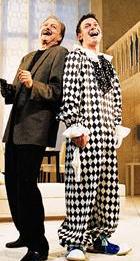SITE GUIDE
SEARCH
REVIEWS
REVIEW ARCHIVES
ADVERTISING AT CURTAINUP
FEATURES
NEWS
Etcetera and
Short Term Listings
LISTINGS
Broadway
Off-Broadway
NYC Restaurants
BOOKS and CDs
OTHER PLACES
Berkshires
London
California
Connecticut
New Jersey
DC
Philadelphia
Elsewhere
QUOTES
TKTS
PLAYWRIGHTS' ALBUMS
LETTERS TO EDITOR
FILM
LINKS
MISCELLANEOUS
Free Updates
Masthead
Writing for Us
A CurtainUp Review
Sleuth
By Brian Clover
|
It's a bloody sight harder to entertain than to bore.
—Anthony Shaffer |

Peter Bowles as Andrew Wyke and Gray O'Brien as Milo Tindle
(Photo: Sheila Burnett) |
Dating from 1970, Sleuth was the first piece of Anthony Shaffer, twin brother of playwright Peter, and clocked up a creditable 4000 plus performances in London and New York. Shaffer went on to write movies, including Death on the Nile, Frenzy and Sommersby. Sleuth itself was also filmed successfully with Laurence Olivier and Michael Caine. But you have to forget about all that because Sleuth is a tricksy-twisty play full of surprises you need to come to afresh. If you plan to see it yourself, avoid those who already have: loved ones must be shushed, strangers put politely but firmly in their place. It won't hurt you to know that rich and famous Andrew Wyke (Peter Bowles), thriller writer to the gentry, invites young businessman Milo Tindle (Gray O'Brien) to his mansion for a drink. There is something urgent to discuss: Milo's affair with Andrew's wife. Andrew is urbane, even cynical, about marriage, while Milo is passionate and sincere in his love for the older man's wife. Recognising this, Andrew suggests an unusual plan, a plan both dangerous and criminal. Milo's reaction starts a deadly chain of events that leaves bodies on the carpet, blood on the stairs and detectives at the door. It is like playing Cluedo with Tom Stoppard.
Sleuth juggles a number of themes — deceit, jealousy, game playing, class war, British arrogance, and the humiliation of the outsider—- and manages not to drop any of them. But does it still work 30 years later? I think not. Sleuth is sadly dated. The world has moved on. No one now writes cosy crime novels like Andrew's; both he and they seem very corny to us. Andrew's schemes would not fool a modern teenager, even less a successful businessman. It is also hard to sympathise with Andrew's motive for hating Milo: this is not sexual jealousy, as he makes clear, but because his rival only went to a minor private school! Upstart Milo needs to be put in his place.
By now we have seen too many detectives and detective stories to believe in Sleuth's plotting, characterisation and stage craft. Audiences in 1970 may have thrilled to the spectacle of a safe blowing open, but today it looks mildly silly, as does the waving about of a revolver.
Director Elijah Moshinsky perversely highlights these anachronisms by trying to update the play. Social dinosaur Andrew now has a mobile phone and remote-controlled hi-fi. His baronial hall, hinting at the play's origins in the genre of country house murder, has been whited-out and minimalised in a way that is completely at odds with everything the man says and thinks. Andrew is a snob with 1950's ruling class values. He shudders at the sight of a bright jacket lining so I cannot imagine this staunch traditionalist even entering a gallery selling white on white paintings, let alone buying one. The total effect is as if Britain's Queen Elizabeth were to open Parliament dressed in DKNY tee-shirt and jeans - stylish perhaps, but decidedly misjudged.
Directorial uncertainty also makes for uneven pacing, weak characterisation and loss of subtlety. The rising climax of the second act which should be tense and chilling comes across as a ludicrous parlour game. The excellent Peter Bowles is Andrew, but seems to have been told to impersonate John Cleese. This is a mistake. His natural amiability works against Andrew's menace and neither his venom nor his crack-up really convince. Gray O'Brien as Milo carries half his burden very well, but seems uncertain otherwise. He cannot convey Milo's essential tragic vulnerability, particularly when stripped to his shorts and flexing a beefcake of a body that belongs to a runner-up in the local heat of a Mr Universe contest. As a result neither his fatal entanglement in Andrew's games nor his final action make any real sense. Nor does his one day transformation from plain travel agent to witty expert in Latin and 14th Century French.
Both actors work very hard, but are easily defeated by the play itself and the choice of direction. Perhaps the only way to produce Sleuth is as a straight revival, creating the sets, costumes and values of its time, as you might enjoy a Victorian melodrama or an old Sherlock Holmes movie on TV. The sad truth is Sleuth is not as clever as it thinks it is: it can still entertain, but it needs to work a lot harder than this production does.
| Sleuth
Written by Anthony Shaffer Directed by Elijah Moshinsky Designed by Paul Farnsworth Starring: Peter Bowles With: Gray O'Brien, Seamus Dobony, James Forge, Matthew Knott Lighting Designer: Nick Richings Sound Designer: Simon Whitehorn Running time: Two hours thirty minutes with one interval Box Office: 0870 890 1101 Booking to 28th September 2002 Reviewed by Brian Clover based on 11th July 2002 performance at the Apollo Theatre, Shaftesbury Avenue, London W1 (Tube Station: Picadilly Circus) |

6, 500 Comparative Phrases including 800 Shakespearean Metaphors by CurtainUp's editor.
Click image to buy.
Go here for details and larger image.



